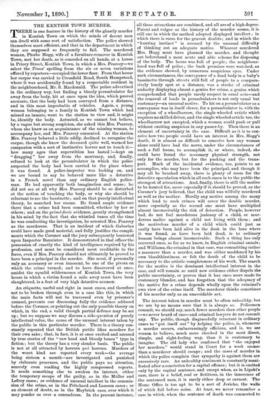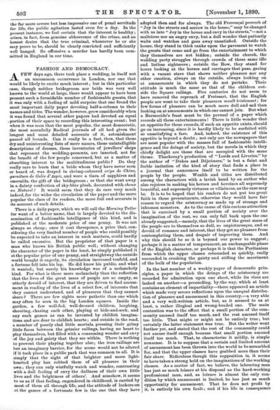THE KENTISH TOWN MIIRDER.
THERE is one feature in the history of the ghastly murder in Kentish Town on which the minds of decent men can dwell with some sort of satisfaction. The police showed themselves most efficient, and that in the department in which they are supposed so frequently to fail. The murdered woman, Phcebe Hogg, wife of a furniture-remover in Kentish Town, met her death, as is conceded on all hands, at a house in Priory Street, Kentish Town, in which a Mrs. Pearcey—we select the Times' spelling from the six or seven variations offered by reporters—occupied the lower floor. From that house her corpse was carried to Crossfield Road, South Hampstead, where it was accidentally found by a respectable resident in the neighbourhood, Mr. S. Macdonald. The police advertised in the ordinary way, but finding a bloody perambulator far away from the body, hit at once upon. the idea, which proved accurate, that the body had been conveyed from a distance, and in this most improbable of vehicles. Again, a young woman belonging to a family in Kentish Town which had missed an inmate, went to the station to view and, it might be, identify the body. Actuated, as we cannot but believe, by a vague but strong suspicion, she asked this Mrs. Pearcey, whom she knew as an acquaintance of the missing woman, to accompany her, and Mrs. Pearcey consented. At the station Mrs. Pearcey behaved a little oddly, declined to recognise the corpse, though she knew the deceased quite well, warned her companion with a sort of instinctive horror not to touch it— how many ages that superstition has lasted !—kept on " dragging " her away from the mortuary, and, finally, refused to look at the perambulator in which the police suspected the body had been carried to the place where it was found. A police-inspector was looking on, and we are bound to say he behaved more like a detective in a French novel than any ordinary English police- man He had apparently both imagination and sense ; he did not see at all why Mrs. Pearcey should be so disturbed at the notion of touching the body, or why she should be reluctant to see the bassinette ; and on that purely intellectual theory, he searched her rooms. He found ample evidence there that a crime had been committed, whether by her or others ; and on the primci-facie evidence, greatly strengthened in his mind by the fact that she whistled tunes all the time he was conducting the investigation, he arrested Mrs. Pearcey as the murderess. That is an incident of which Gaboriau could have made good material, and fully justifies the compli- ments which the Coroner and the jury subsequently bestowed upon Inspector Bannister. It demonstrated in that officer the possession of exactly the kind of intelligence required by his profession, and must be considered most creditable to the force, even if Mrs. Pearcey should not ultimately be proved to have been a principal in the murder. She must, if personally only an accessory or even innocent, be one of the pivots on which the crime turned; and to have discovered at once, amidst the squalid wildernesses of Kentish Town, the very house in which a victim found a mile away must have been slaughtered, is a feat of very high detective acumen.
An etiquette, useful and right in most cases, and therefore not to be broken through even in a case like this, in which the main facts will not be traversed even by prisoner's counsel, prevents our discussing fully the evidence adduced before the Coroner, or pointing out the only possible theory on which, in the end, a valid though partial defence may be set up ; but we suppose we may discuss a side-question of purely intellectual value, the cause of the unusual interest taken by the public in this particular murder. There is a theory con- stantly repeated that the British public likes murders for their own sake ; that, in fact, it is at once excited and amused by true stories of the " raw head and bloody bones" type in fiction ; but the theory has a very slender basis. The public is not at all attracted by horrors qua,' horrors. Murders of the worst kind are reported every week—the average being sixteen a month—are investigated and punished by elaborate processes, and the public pays no attention, scarcely even reading the highly compressed reports. It needs something else to awaken its interest, either the temporary escape of the guilty, as in the Muller and Lefroy cases ; or evidence of unusual intellect in the commis- sion of the crime, as in the Pritchard and Lamson cases ; or an element of doubt, as in the Maybrick case, over which it may ponder as over a conundrum. In the present instance, all these attractions are combined, and all are of a high degree. Patent and vulgar as the history of the murder seems, it is still one in which the method adopted displayed intellect ; in which there is room for the gravest doubts ; and in which the " hunting instinct " is aroused by the unusual difficulty of thinking out an adequate motive. Whoever murdered Mrs. Hogg must have planned the murder, and thought out beforehand a most acute and able scheme for disposing of the body. The house was fall of people ; the neighbour- hood was full of police ; the back premises were watched, as the evidence showed, by numerous suspicious eyes. Under such circumstances, the conveyance of a dead body in a baby's bassinette through streets still full of people to a compara- tively lonely spot at a distance, was a stroke of criminal audacity displaying almost a genius for crime, a genius which comprehended that people rarely suspect in usual acts—and the removal of loads in perambulators is not only usual but customary—an unusual motive. To hit on a perambulator as a conveyance was in itself clever, for a perambulator is, with the exception of a wheelbarrow, the single wheeled article which requires no skilled driver, and the single wheeled article too, the wheelbarrow not excepted, which a woman could push or pull without exciting suspicion in any passer-by. Then there is an element of uncertainty in the case. Difficult as it is to con- ceive how two people could have an interest in Mrs. Hogg's death, it is almost as difficult to conceive how any woman alone could have had the nerve, under the circumstances of such a full house, to accomplish it, or. where, indeed, she could have found the necessary physical strength, not only for the murder, but for the packing and the trans- port. Much of the incidental evidence, too, points to an accomplice, who may have been the principal, and though it may all be brushed away, there is plenty of room for the detective speculation which in all such cases is to the public the strongest of attractions. And, finally, there is still the motive to be hunted for, more especially if it should be proved, as the Coroner's jury believed, that the child was wilfully murdered as well as the mother. Hardly any motive among the many which lead to such crimes will cover the double murder, more especially as the second one must have multiplied almost inconceivably the risk of detection. People, however bad, do not feel murderous jealousy of a child, or mur- derous malice against a child not living with them ; and the motiveless murder of a child which could just as easily have been laid alive in the dusk in the lane where it was found, as have been laid dead, is to ordinary human beings almost inconceivable. Such a thing has only occurred once, so far as we know, in English criminal annals ; and Williams, the criminal in that case, was committing rather a massacre than a murder, and was either maddened by his own bloodthirstiness, or felt the death of the child to be necessary to the artistic completeness of his work. The search for the motive is the dominant intellectual interest in the case, and will remain so until new evidence either dispels the public uncertainty, or proves that it has once more made its customary blunder, and has forgotten that the adequacy of the motive for a crime depends wholly upon the criminal's own view of the crime itself. The murderer thinks sometimes of his murder only as an unavoidable act.
The interest taken in murder must be often unhealthy, but we are by no means sure that it is always so. Policemen commit, we should say, much fewer murders than other people —we never heard of one—and criminal lawyers do not commit any. The public, though disgracefully reluctant in ordinary cases to "put itself out" by helping the police, is, whenever a murder occurs, embarrassingly officious, and is, we see reason to believe, much more shocked in the most direct, simple, and right-feeling way, than it is customary to imagine. The old lady who confessed that "she enjoyed her murders," would stand in Court for a week sooner than a murderer should escape ; and the cases of murder in which the police complain that sympathy is against them are excessively rare. An unhealthy sentiment is constantly mani- fested after a conviction for a capital offence; but it is excited only by the capital sentence, and except when, as in Lipoid's case, there is a belief, real or fictitious, in the innocence of the sentenced man, it is rarely either deep or earnest. The Home Office is too apt to be a sort of Jericho, the walls of which fall before noise. At least, we never remember a case in which, when the sentence of death was commuted to
the far more severe but less impressive one of penal servitude for life, the public agitation lasted even for a day. In the present instance, we feel certain that the interest is healthy ; arises, in fact, from genuine abhorrence of the crime, and an honest desire that the true criminal, whosoever he or she may prove to be, should be clearly convicted and sufficiently well hanged. So offensive a murder has hardly been com- mitted in England in our time.



















































 Previous page
Previous page